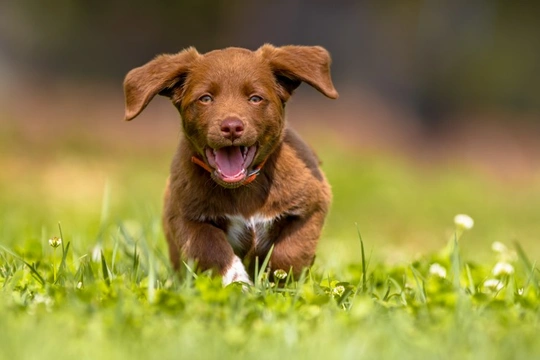
Training a puppy not to run away
If you own an adult dog that is prone to running off or bolting away from you when out on walks and failing to return when called, this can cause a whole host of problems that will require a lot of work and effort to correct.
A propensity to run off and/or not to return when called can develop at any stage in a dog’s life depending on their personality, training and other factors, but such behaviours are more likely to begin when your dog is still a pup. This means that by the time they reach adulthood this type of behaviour can already have become ingrained and so, that much harder to fix.
If your puppy runs off, ignores you and fails to respond when you try to check or recall them, you should pay serious attention to nipping the issue in the bud and correcting this behaviour before it becomes a habit, and harder to resolve later on.
In this article we will teach you how to take steps to prevent your puppy from running off, and share some advice on how to correct and manage such behaviour so that it is not a problem later on. Read on to learn more about training a puppy not to run away.
Your puppy’s lifestyle
Before you start to address any specific training or behaviour issues in a dog of any age, you first need to objectively review your pup’s lifestyle, how well it suits them, and if it might be contributing to the problem at hand. This enables you to identify if there are any lifestyle changes that you can make to help to correct your pup’s behaviour.
If your pup is being fed the wrong type of diet, isn’t getting enough exercise, doesn’t get the chance to play with other dogs or is simply being left alone for too long at a time or is bored, this is likely to manifest in all types of training and behaviour issues, of which running off is just one of them.
Making the appropriate changes to your puppy’s lifestyle will make redirecting their poor behaviours and correcting issues like running away much easier.
Working out what is happening
Next, you need to review and assess exactly what happens when your puppy runs off and fails to respond; what sort of situations does this happen in, how does your dog react, and what is the reward for your dog in this behaviour?
If your dog bolts off as soon as you take them out for a walk, they might just be full of beans and fizzing with excess energy, which indicates that they’re not getting enough exercise or not being walked frequently enough.
If your pup always runs off after other dogs or people, they could be looking for company and the chance to socialise, and so providing more of this can help too.
If your dog doesn’t listen when you recall them, they either don’t understand the command you are giving in the situation at hand, or they have learned irrelevance to it; there is no reward in compliance, and returning to you will curtail their fun, so they stay away.
When you have pinpointed the type of scenario or cause of the issue, you will be better positioned to retrain your pup and correct it.
Preventing your pup from running off
Retraining a puppy to keep them from running off and to ensure that they return when called is easier than doing the same for an adult dog, but it can still be a time consuming and intensive process. This means that you need to be able to prevent your puppy from running off in the meantime while you work to correct the issue.
This may mean keeping your dog on the lead in situations where you might otherwise let them off, and ensuring that they only run freely within safely enclosed areas, which is something your pup needs to be able to do every day.
If certain things seem to trigger running off such as opening a door or letting your dog out into the garden, be aware of this and mitigate it accordingly.
Training your puppy not to run off
Recall training can be hard to achieve successfully, but puppies are more receptive to following direction and learning new skills than older dogs, and so now is the time to get on top of things.
“Wait” and “come back” are the two vital commands your puppy needs to learn to keep them from running off and to get them to return when they do, and this means that your pup needs to not only understand both of these commands but also, be appropriately incentivised to follow them.
To achieve reliable compliance with any command, your dog has to see the value in following it, which means that they need to associate being checked or recalled with a positive experience when they do as they are asked – and an exasperated, flustered or angry owner who puts the dog back on the lead and hauls them off does not constitute an incentive to return!
Begin with getting your dog to respond to their name and look to you when you use it with some training treats, and then work up to using your pup’s name to get their attention then giving the wait or “come back” command with a treat.
Once your pup associates recall and waiting with a reward and the other factors in their life support this (like being fed the right foods and getting enough walks and stimulation) their behaviour will improve, and with regular refresher training, should remain consistent for life.



